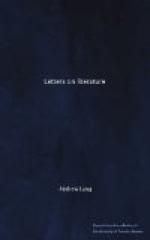Miss Jervois, who is Richardson’s idea of a jeune personne bien elevee, is a compound of tears, of servility, and of undisguised love for her guardian. She is much more like the heroine of a French drama than an English girl of fourteen, and I dread to think what effect she would have on a free-born American! Harriet, as you know, is not quite hopeless at first, but the descent is easy, and, in the end, we quite agree with all the admiring circle, that they were made for each other. They were equally pompous, and used stilts of equal height.
“Sir Charles Grandison” was the last, the most socially ambitious, and much the worst of Richardson’s novel’s. Smollett came to his best in his last, “Humphrey Clinker.” Fielding sobered down into the kind excellence of his last, “Amelia.” Neither had been flattered and coddled by literary ladies, like Richardson. What of “Pamela” and “Clarissa”? May a maiden read the book that the young lady studied over Charles Lamb’s shoulder? Well, I think, as you have now passed your quarter of a century, it would do you no harm to read the other two, which are infinitely better than “Sir Charles.” The worthy Miss Byron, aged only twenty, indeed, writes to her Lucy to remind her that “their grandmother had told them twenty and twenty frightful stories of the vile enterprises of men against innocent creatures,” and that they can both “call to mind stories which had ended much worse than hers (the affair with Sir Hargrave Pollexfen) had done.”
Grandmothers now choose other topics of conversation for their descendants, but in those old days when sedan-chairs made enlevements so very easy, it was considered necessary to caution girls against all the possible wiles of man. Even little boys, strange as it may sound, were given “Pamela” to read after the Bible. More than this, one small creature, Harry Campbell by name, so young that he always spoke of himself as “little Harry,” obtained the book by stealth in his guardian’s house, and never stopped till he finished it. When Richardson, on being told of this, sent him a copy for his own, he nearly went out of his senses with delight.
Of course you know the outline of Pamela’s story. How at eleven she was taken and educated by a lady, who on her death, when Pamela was sixteen, left her not only more beautiful, but more accomplished than any girl of her years. How Pamela’s young master fell in love with her, persecuted her, and after moving adventures of all kinds, being convinced that she was not to be overcome, married her, and they lived happy, with one brief exception, ever after. The proper frame of mind in which to read “Pamela” is to consider it in the light of an historical joke.




